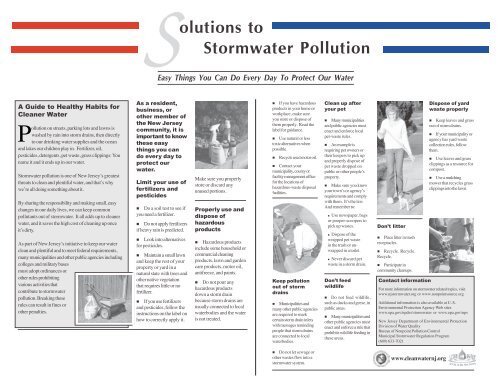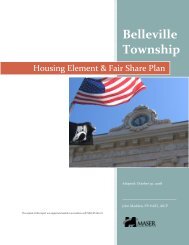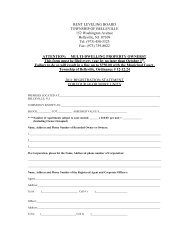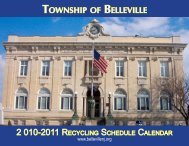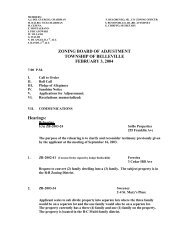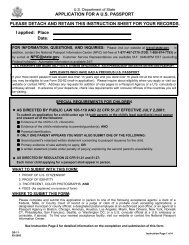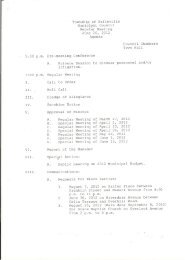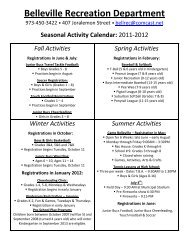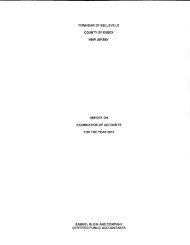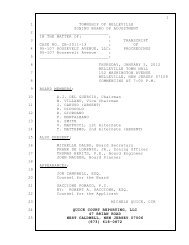2011-2012 Recycling Schedule Calendar - Belleville, NJ
2011-2012 Recycling Schedule Calendar - Belleville, NJ
2011-2012 Recycling Schedule Calendar - Belleville, NJ
Create successful ePaper yourself
Turn your PDF publications into a flip-book with our unique Google optimized e-Paper software.
Pollution on streets, parking lots and lawns is<br />
washed by rain into storm drains, then directly<br />
to our drinking water supplies and the ocean<br />
and lakes our children play in. Fertilizer, oil,<br />
pesticides, detergents, pet waste, grass clippings: You<br />
name it and it ends up in our water.<br />
Stormwater pollution is one of New Jersey’s greatest<br />
threats to clean and plentiful water, and that’s why<br />
we’re all doing something about it.<br />
By sharing the responsibility and making small, easy<br />
changes in our daily lives, we can keep common<br />
pollutants out of stormwater. It all adds up to cleaner<br />
water, and it saves the high cost of cleaning up once<br />
it’s dirty.<br />
As part of New Jersey’s initiative to keep our water<br />
clean and plentiful and to meet federal requirements,<br />
many municipalities and other public agencies including<br />
colleges and military bases<br />
must adopt ordinances or<br />
other rules prohibiting<br />
various activities that<br />
contribute to stormwater<br />
pollution. Breaking these<br />
rules can result in fines or<br />
other penalties.<br />
Do a soil test to see if<br />
you need a fertilizer.<br />
Do not apply fertilizers<br />
if heavy rain is predicted.<br />
Look into alternatives<br />
for pesticides.<br />
Maintain a small lawn<br />
and keep the rest of your<br />
property or yard in a<br />
natural state with trees and<br />
other native vegetation<br />
that requires little or no<br />
fertilizer.<br />
If you use fertilizers<br />
and pesticides, follow the<br />
instructions on the label on<br />
how to correctly apply it.<br />
Make sure you properly<br />
store or discard any<br />
unused portions.<br />
Hazardous products<br />
include some household or<br />
commercial cleaning<br />
products, lawn and garden<br />
care products, motor oil,<br />
antifreeze, and paints.<br />
Do not pour any<br />
hazardous products<br />
down a storm drain<br />
because storm drains are<br />
usually connected to local<br />
waterbodies and the water<br />
is not treated.<br />
If you have hazardous<br />
products in your home or<br />
workplace, make sure<br />
you store or dispose of<br />
them properly. Read the<br />
label for guidance.<br />
Use natural or less<br />
toxic alternatives when<br />
possible.<br />
Recycle used motor oil.<br />
Contact your<br />
municipality, county or<br />
facility management office<br />
for the locations of<br />
hazardous-waste disposal<br />
facilities.<br />
Municipalities and<br />
many other public agencies<br />
are required to mark<br />
certain storm drain inlets<br />
with messages reminding<br />
people that storm drains<br />
are connected to local<br />
waterbodies.<br />
Do not let sewage or<br />
other wastes flow into a<br />
stormwater system.<br />
Many municipalities<br />
and public agencies must<br />
enact and enforce local<br />
pet-waste rules.<br />
An example is<br />
requiring pet owners or<br />
their keepers to pick up<br />
and properly dispose of<br />
pet waste dropped on<br />
public or other people’s<br />
property.<br />
Make sure you know<br />
your town’s or agency’s<br />
requirements and comply<br />
with them. It’s the law.<br />
And remember to:<br />
Use newspaper, bags<br />
or pooper-scoopers to<br />
pick up wastes.<br />
Dispose of the<br />
wrapped pet waste<br />
in the trash or unwrapped<br />
in a toilet.<br />
Never discard pet<br />
waste in a storm drain.<br />
Do not feed wildlife,<br />
such as ducks and geese, in<br />
public areas.<br />
Many municipalities and<br />
other public agencies must<br />
enact and enforce a rule that<br />
prohibits wildlife feeding in<br />
these areas.<br />
Place litter in trash<br />
receptacles.<br />
Recycle. Recycle.<br />
Recycle.<br />
Participate in<br />
community cleanups.<br />
Keep leaves and grass<br />
out of storm drains.<br />
If your municipality or<br />
agency has yard waste<br />
collection rules, follow<br />
them.<br />
Use leaves and grass<br />
clippings as a resource for<br />
compost.<br />
Use a mulching<br />
mower that recycles grass<br />
clippings into the lawn.<br />
For more information on stormwater related topics, visit<br />
www.njstormwater.org or www.nonpointsource.org<br />
Additional information is also available at U. S.<br />
Environmental Protection Agency Web sites<br />
www.epa.gov/npdes/stormwater or www.epa.gov/nps<br />
New Jersey Department of Environmental Protection<br />
Division of Water Quality<br />
Bureau of Nonpoint Pollution Control<br />
Municipal Stormwater Regulation Program<br />
(609) 633-7021<br />
www.cleanwaternj.org


